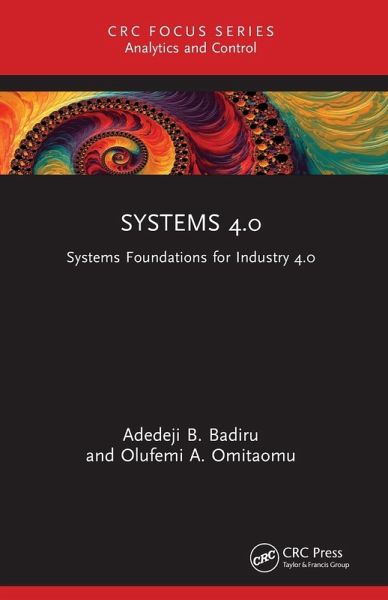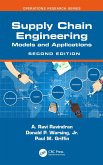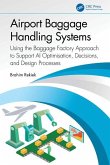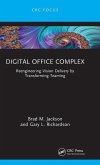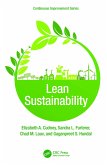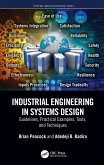Adedeji B. Badiru (Dean Graduate School of Engineering a Professor, Olufemi A. Omitaomu
Systems 4.0
Systems Foundations for Industry 4.0
Adedeji B. Badiru (Dean Graduate School of Engineering a Professor, Olufemi A. Omitaomu
Systems 4.0
Systems Foundations for Industry 4.0
- Broschiertes Buch
- Merkliste
- Auf die Merkliste
- Bewerten Bewerten
- Teilen
- Produkt teilen
- Produkterinnerung
- Produkterinnerung
The underlying premise for Industry 4.0 is a systems approach. This book introduces the concept of Systems 4.0 as a foundational requirement for the success of Industry 4.0 in the same way that Quality 4.0 has emerged to advance Industry 4.0.
Andere Kunden interessierten sich auch für
![Supply Chain Engineering Supply Chain Engineering]() A. Ravi Ravindran (USA Penn State Univ)Supply Chain Engineering157,99 €
A. Ravi Ravindran (USA Penn State Univ)Supply Chain Engineering157,99 €![Airport Baggage Handling Systems Airport Baggage Handling Systems]() Brahim RekiekAirport Baggage Handling Systems53,99 €
Brahim RekiekAirport Baggage Handling Systems53,99 €![Applied Design Research in Living Labs and Other Experimental Learning and Innovation Environments Applied Design Research in Living Labs and Other Experimental Learning and Innovation Environments]() Applied Design Research in Living Labs and Other Experimental Learning and Innovation Environments61,99 €
Applied Design Research in Living Labs and Other Experimental Learning and Innovation Environments61,99 €![Digital Office Complex Digital Office Complex]() Brad M. JacksonDigital Office Complex77,99 €
Brad M. JacksonDigital Office Complex77,99 €![Lean Sustainability Lean Sustainability]() Elizabeth A. Cudney (Maryville University, St. Louis, USA)Lean Sustainability117,99 €
Elizabeth A. Cudney (Maryville University, St. Louis, USA)Lean Sustainability117,99 €![Industrial Engineering in Systems Design Industrial Engineering in Systems Design]() Brian PeacockIndustrial Engineering in Systems Design158,99 €
Brian PeacockIndustrial Engineering in Systems Design158,99 €![Engaging the Team at Zingerman's Mail Order Engaging the Team at Zingerman's Mail Order]() Eduardo LanderEngaging the Team at Zingerman's Mail Order37,99 €
Eduardo LanderEngaging the Team at Zingerman's Mail Order37,99 €-
-
-
The underlying premise for Industry 4.0 is a systems approach. This book introduces the concept of Systems 4.0 as a foundational requirement for the success of Industry 4.0 in the same way that Quality 4.0 has emerged to advance Industry 4.0.
Hinweis: Dieser Artikel kann nur an eine deutsche Lieferadresse ausgeliefert werden.
Hinweis: Dieser Artikel kann nur an eine deutsche Lieferadresse ausgeliefert werden.
Produktdetails
- Produktdetails
- Analytics and Control
- Verlag: Taylor & Francis Ltd
- Seitenzahl: 138
- Erscheinungstermin: 29. November 2024
- Englisch
- Abmessung: 138mm x 216mm x 13mm
- Gewicht: 200g
- ISBN-13: 9781032319902
- ISBN-10: 1032319909
- Artikelnr.: 71912596
- Herstellerkennzeichnung
- Libri GmbH
- Europaallee 1
- 36244 Bad Hersfeld
- gpsr@libri.de
- Analytics and Control
- Verlag: Taylor & Francis Ltd
- Seitenzahl: 138
- Erscheinungstermin: 29. November 2024
- Englisch
- Abmessung: 138mm x 216mm x 13mm
- Gewicht: 200g
- ISBN-13: 9781032319902
- ISBN-10: 1032319909
- Artikelnr.: 71912596
- Herstellerkennzeichnung
- Libri GmbH
- Europaallee 1
- 36244 Bad Hersfeld
- gpsr@libri.de
Dr. Adedeji Badiru is a Professor of Systems Engineering at the Air Force Institute of Technology (AFIT). He is a registered professional engineer and a fellow of the Institute of Industrial Engineers as well as a Fellow of the Nigerian Academy of Engineering. He has a BS degree in Industrial Engineering, MS in Mathematics, and MS in Industrial Engineering from Tennessee University, and Ph.D. in Industrial Engineering from the University of Central Florida. He is the author of several books and technical journal articles and has received several awards and recognitions for his accomplishments. His special skills, experience, and interests center on research mentoring of faculty and graduate students. Dr. Femi Omitaomu is a Senior R&D Staff in Computational Urban Sciences Group within the Advanced Computing Methods for Engineering Systems Section in Computational Sciences and Engineering Division at Oak Ridge National Laboratory (ORNL). He has more than 15 years of experience in research, development, and demonstration of innovative systems and methods in the areas of energy infrastructure siting, energy systems resilience, and disaster risk analysis. He has two issued US patents and several invention disclosures. He is the lead developer of major Department of Energy's technologies including OR-SAGE (Oak Ridge Siting Analysis for Generation Expansion), CoNNECT (Citizen Engagement for Energy Efficiency and Renewable Integration), and Precision Deicer. He received the 2021 R&D 100 Award for Precision Deicer and the 2015 R&D 100 Finalist Award for CoNNECT. Femi joined ORNL as a Post-Doc in October 2006. Between October 2014 and September 2018, he was Team Lead for the Critical Infrastructure and Climate Change Team in Computational Sciences and Engineering Division at ORNL and Theme Lead for the Urban Resiliency Theme in ORNL's Urban Dynamics Institute. He is currently the Acting Group Leader for Computational Urban Sciences research at ORNL. Femi is also an Adjunct Professor in the Department of Industrial and Systems Engineering and an Adjunct Professor in the Department of Civil and Environmental Engineering Department at the University of Tennessee, Knoxville. Prior to joining ORNL, Femi was a project engineer with Mobil Producing Nigeria (an ExxonMobil company). He holds a Ph.D. in Industrial Engineering with concentration in information engineering from the University of Tennessee. He has also M.S. and B.S. degrees in Mechanical Engineering from University of Lagos, Nigeria and Lagos State University, Nigeria, respectively. He is a senior member of several professional organizations including IEEE (Institute of Electrical and Electronic Engineers) and IISE (Institute of Industrial and Systems Engineers). He is also a member of AAAI (Association for the Advancement of Artificial Intelligence).
1. Fundamentals of Industry 4.0. 2. Elements of Systems 4.0. 3. Digital
Manufacturing in Industry 4.0. 4. DEJI Systems Model in Industry 4.0. 5.
Industry 4.0 Technology Transfer Within Systems 4.0. 6. Technology Cost
Analysis in Systems 4.0. 7. Computational Tools for Systems 4.0.
Manufacturing in Industry 4.0. 4. DEJI Systems Model in Industry 4.0. 5.
Industry 4.0 Technology Transfer Within Systems 4.0. 6. Technology Cost
Analysis in Systems 4.0. 7. Computational Tools for Systems 4.0.
1. Fundamentals of Industry 4.0. 2. Elements of Systems 4.0. 3. Digital
Manufacturing in Industry 4.0. 4. DEJI Systems Model in Industry 4.0. 5.
Industry 4.0 Technology Transfer Within Systems 4.0. 6. Technology Cost
Analysis in Systems 4.0. 7. Computational Tools for Systems 4.0.
Manufacturing in Industry 4.0. 4. DEJI Systems Model in Industry 4.0. 5.
Industry 4.0 Technology Transfer Within Systems 4.0. 6. Technology Cost
Analysis in Systems 4.0. 7. Computational Tools for Systems 4.0.

